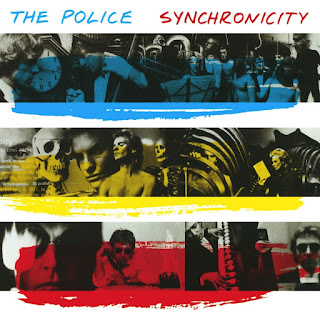It's a well-known phenomenon that when you are learning new material, you suddenly start seeing it pop up in different places, in what appears to be an uncanny manner. This is mostly explainable by the fact that, when you are more aware of a particular phenomenon, you are much more likely to consciously notice it.
Sometimes coincidence in timing appears more like synchronicity, Jung's acausal connecting principle (perhaps made most famous by the cover of the Police album.) For instance, similar themes I recently analyzed in Annotated Games #231 and #232 just appeared in the "Quiescence" post from dana blogs chess.
I view this phenomenon as a benefit of chess study. Exploring different situations and ideas will, it seems, almost inevitably lead - often seemingly by chance - to deeper understanding and enhanced pattern recognition both in your own games and when examining those of others. This is an advantage of exposing yourself during the course of training to broader material, such as collected master/GM-level annotated games, that go beyond the narrow range of your own opening lines. Not only are new concepts introduced, but you can also see familiar patterns in different circumstances.
This is not a new idea - one other example mentioned previously on this blog was "An improved version of the Fajarowicz Gambit?" - but I believe it's worth highlighting again, as a motivational factor in chess study. While too much training (especially when very repetitive) can lead to diminishing returns, broadening your study horizon can lead to new breakthroughs and insights into the game, which is how we become stronger over time.
Sometimes coincidence in timing appears more like synchronicity, Jung's acausal connecting principle (perhaps made most famous by the cover of the Police album.) For instance, similar themes I recently analyzed in Annotated Games #231 and #232 just appeared in the "Quiescence" post from dana blogs chess.
I view this phenomenon as a benefit of chess study. Exploring different situations and ideas will, it seems, almost inevitably lead - often seemingly by chance - to deeper understanding and enhanced pattern recognition both in your own games and when examining those of others. This is an advantage of exposing yourself during the course of training to broader material, such as collected master/GM-level annotated games, that go beyond the narrow range of your own opening lines. Not only are new concepts introduced, but you can also see familiar patterns in different circumstances.
This is not a new idea - one other example mentioned previously on this blog was "An improved version of the Fajarowicz Gambit?" - but I believe it's worth highlighting again, as a motivational factor in chess study. While too much training (especially when very repetitive) can lead to diminishing returns, broadening your study horizon can lead to new breakthroughs and insights into the game, which is how we become stronger over time.

Thanks for reminding me of this great album. I immediately got it out and played it.
ReplyDeleteDo vinyl and chess go together?